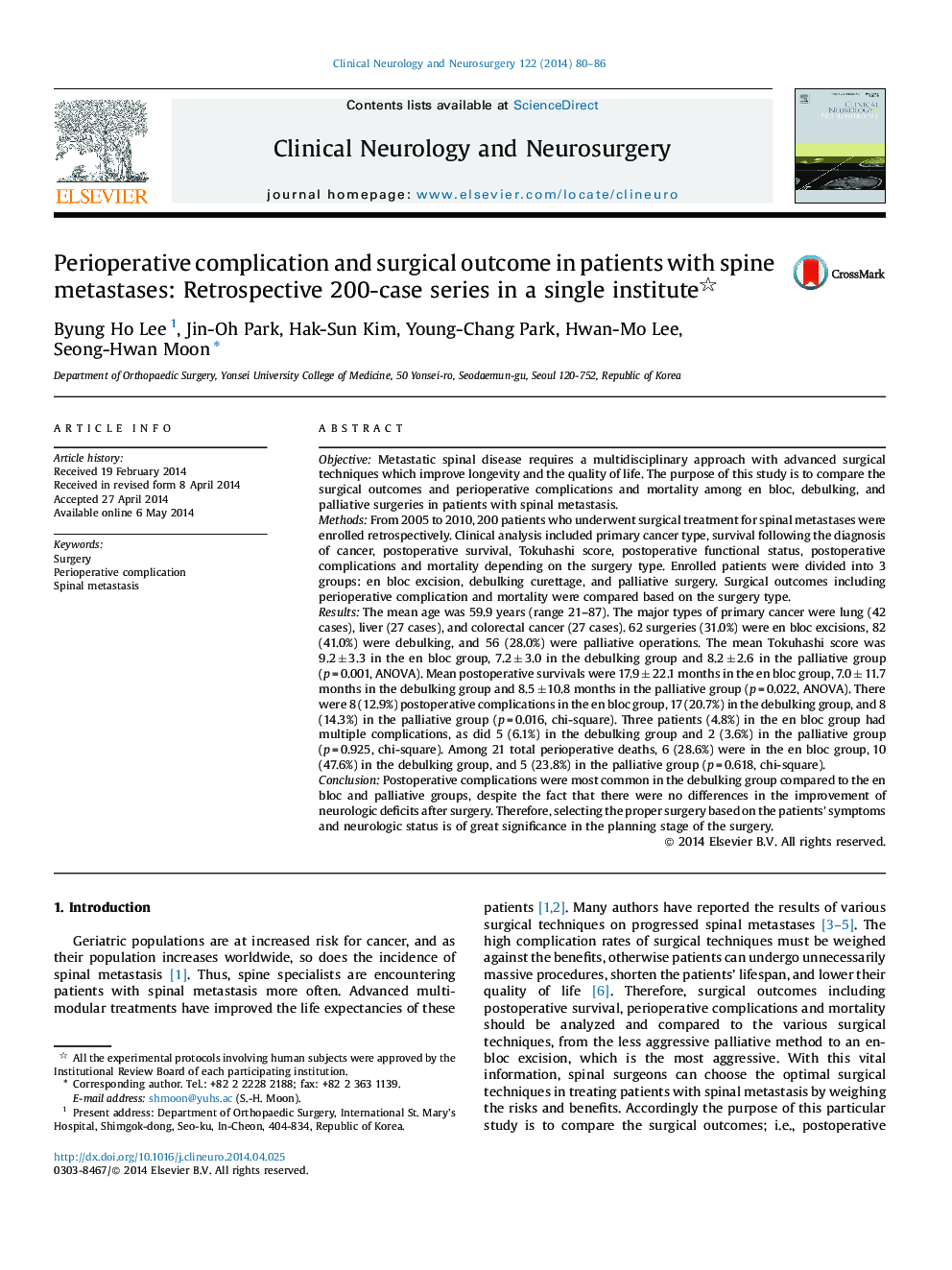| کد مقاله | کد نشریه | سال انتشار | مقاله انگلیسی | نسخه تمام متن |
|---|---|---|---|---|
| 3040256 | 1579700 | 2014 | 7 صفحه PDF | دانلود رایگان |
• This study demonstrated 200 patients of spinal metastases from a single institute between 2005 and 2010.
• Postoperative neurologic status affected the postoperative survival depending on the surgery type (en bloc excision, debulking curettage, and palliative surgery).
• Debulking operation demonstrated highest incidence of perioperative complications, despite the fact that there were no differences in the improvement of neurologic deficits after surgery.
ObjectiveMetastatic spinal disease requires a multidisciplinary approach with advanced surgical techniques which improve longevity and the quality of life. The purpose of this study is to compare the surgical outcomes and perioperative complications and mortality among en bloc, debulking, and palliative surgeries in patients with spinal metastasis.MethodsFrom 2005 to 2010, 200 patients who underwent surgical treatment for spinal metastases were enrolled retrospectively. Clinical analysis included primary cancer type, survival following the diagnosis of cancer, postoperative survival, Tokuhashi score, postoperative functional status, postoperative complications and mortality depending on the surgery type. Enrolled patients were divided into 3 groups: en bloc excision, debulking curettage, and palliative surgery. Surgical outcomes including perioperative complication and mortality were compared based on the surgery type.ResultsThe mean age was 59.9 years (range 21–87). The major types of primary cancer were lung (42 cases), liver (27 cases), and colorectal cancer (27 cases). 62 surgeries (31.0%) were en bloc excisions, 82 (41.0%) were debulking, and 56 (28.0%) were palliative operations. The mean Tokuhashi score was 9.2 ± 3.3 in the en bloc group, 7.2 ± 3.0 in the debulking group and 8.2 ± 2.6 in the palliative group (p = 0.001, ANOVA). Mean postoperative survivals were 17.9 ± 22.1 months in the en bloc group, 7.0 ± 11.7 months in the debulking group and 8.5 ± 10.8 months in the palliative group (p = 0.022, ANOVA). There were 8 (12.9%) postoperative complications in the en bloc group, 17 (20.7%) in the debulking group, and 8 (14.3%) in the palliative group (p = 0.016, chi-square). Three patients (4.8%) in the en bloc group had multiple complications, as did 5 (6.1%) in the debulking group and 2 (3.6%) in the palliative group (p = 0.925, chi-square). Among 21 total perioperative deaths, 6 (28.6%) were in the en bloc group, 10 (47.6%) in the debulking group, and 5 (23.8%) in the palliative group (p = 0.618, chi-square).ConclusionPostoperative complications were most common in the debulking group compared to the en bloc and palliative groups, despite the fact that there were no differences in the improvement of neurologic deficits after surgery. Therefore, selecting the proper surgery based on the patients' symptoms and neurologic status is of great significance in the planning stage of the surgery.
Journal: Clinical Neurology and Neurosurgery - Volume 122, July 2014, Pages 80–86
